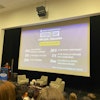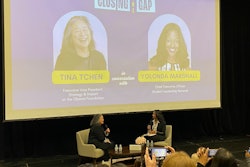A rising young academic, Dr. Elena Shih — assistant professor of American Studies and Ethnic Studies at Brown University and faculty affiliate in sociology at the Watson Institute for International Studies — examines complex issues surrounding women’s lives and survival.
 Dr. Elena Shih
Dr. Elena ShihBy this summer’s end, Shih will complete writing her book Manufacturing Freedom: Trafficking Rescue, Rehabilitation, and the Slave Free Good. The book examines the rise of the anti-trafficking movement from the year 2000 with the United Nations Palermo protocols to prevent, suppress and punish trafficking in persons, especially women and children, and the corresponding U.S. Protection Act of 2000.
Shih, a transnational feminist scholar, describes these as “two watershed pieces of legislation that bring the issue of human trafficking onto the global legal landscape.”
“What’s so interesting about that moment,” she explains, “is that issues of trafficking that encompass labor rights, migration, gender rights, laws against prostitution, have all been dealt with prior to the year 2000, but this is the first time we have this new category scripted into law.”
The U.S. has been a large force in driving global efforts against trafficking. In the book, Shih examines what largely U.S.-driven anti-trafficking norms look like in the transnational movement in China and Thailand. With her doctorate in sociology and her training as an ethnographer, she says embedded participant observation was really important to her.
“I looked at this question microscopically through the idea of the slave free good,” says Shih. “That’s largely an artifact that emerges around the early 2000s, a good that is made by formerly trafficked people.
“In the case that I’m looking at, they’re training former sex workers to make jewelry and then selling the jewelry in the United States as a ‘slave free good’ with all the promises of freedom, an end to enslavement and virtuous wages for victims of trafficking in the global south.”
Shih did extensive research, traveling to Beijing and Bangkok each summer during graduate school, visiting sites where the jewelry is produced. The book examines the new moral and labor regimes that center around acceptable Western femininity when these largely American projects try to transform Asian women’s sexual labor into manual labor.
Making jewelry alongside workers and participating in outreach alongside activists gave Shih insight into the commodity chain. She says the anti-trafficking movement has largely trampled sex worker rights and portrayed sex workers as either victims needing rescue or criminals requiring surveillance. There is very little agency given to workers who want to claim sex work as a choice they make in the uneven economies within which they exist.
Shih first became interested in these issues as an undergraduate student at Pomona College, when she worked as an intake counselor at the Asian Pacific Legal Center in Los Angeles. They were working on the new humanitarian category of visas introduced from the 2000 legislation.
“You would hear exactly how migrant women would tell their stories of migration and then you’d see on paper how you needed to fit that narrative into these strict legal policy statutes,” says Shih. “So many times, you’d have to work with lawyers to take all of the agency out of the migrant workers’ stories to make them seem like victims in accordance to law.
“There was this discord that I felt between people’s lived realities, their stories and what legal and policy scripts wanted from them.”
Shih has received several prestigious fellowships to advance her studies. She came to Brown University as a Watson Institute for International Studies postdoctoral fellow — also receiving a faculty position. She is currently a faculty fellow at the Brown University Center for the Study of Slavery and Justice.
The most recent conference Shih worked on was called “Whitewashing Abolition: Race, Displacement, and Combating Human Trafficking.” The March event at Brown carefully looked at the role race plays in efforts to combat trafficking.
At Brown, Shih was asked to design one larger thematic lecture course and several smaller seminar classes. The lecture course, now in its third year, is “The Anti-Trafficking Savior Complex,” which gets about 80-100 students per year. Rather than focusing only on trafficking, the course examines the different types of power that are embedded in anti-trafficking activism.
“The course does deal with what trafficking is and how is that tied to important issues of labor inequality, migrant rights, but also what the implications are of all of these interventions that have happened in its aftermath,” says Shih.
Shih felt she suffered because she hadn’t taken a methods course as an undergraduate, so she teaches research methods in a course on ethnographic field work. There is a participatory component, and the course often focuses on different kinds of community engagement.
“I teach in an American Studies and Ethnic Studies department that cares very much about its responsibility to multiple publics,” Shih says. “Research ethics and the communities they impact are pretty important.”
Thus article appeared in the May 3 issue of Diverse magazine.





















